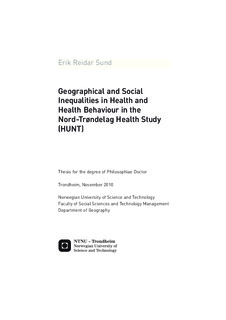| dc.contributor.author | Sund, Erik Reidar | nb_NO |
| dc.date.accessioned | 2014-12-19T14:25:52Z | |
| dc.date.available | 2014-12-19T14:25:52Z | |
| dc.date.created | 2010-11-05 | nb_NO |
| dc.date.issued | 2010 | nb_NO |
| dc.identifier | 369693 | nb_NO |
| dc.identifier.isbn | 978-82-471-2409-3 (printed ver.) | nb_NO |
| dc.identifier.isbn | 978-82-471-2410-9 (electronic ver.) | nb_NO |
| dc.identifier.uri | http://hdl.handle.net/11250/265339 | |
| dc.description.abstract | Health and health behaviour varies both socially and geographically and individuals may experience different degrees of health according to their socioeconomic position and where they live. The fact that health varies geographically is usually given two interpretations. It may arise as a consequence of the composition of individuals according to sociodemographic markers. Alternatively, there may be features associated with the context in which they live that explains geographical health variation. Consequently, individuals’ health may be influenced by both individual factors and contextual factors. The overall aim of this thesis is to analyse whether geographical health variation is due to composition or features associated with context.
Data from the Nord-Trøndelag Health Study (HUNT) in the county of Nord-Trøndelag, Norway, and the statistical technique of multilevel modelling were utilised to analyse these relationships at multiple geographical scales and also across non-geographical contexts.
The overall finding is that geographical health variation in Nord-Trøndelag is rather small and that place makes little difference to the health of individuals. This applies both to the level of municipalities and wards/neighbourhoods. The importance of the family context was also explored, and it was found that health and health behaviour within families seemed to cluster. There was strong behavioural conformity in terms of smoking habits whereas body mass index was weakly to moderately dependent on the family context.
The findings have some clear implications in terms of future disease prevention and health policy. First, targeted area based initiatives towards particular municipalities, or wards, is not warranted in this particular county. It is however difficult to generalise this particular finding across cultures and towards more urban areas, there may be societies where such initiatives may be of importance. Second, there are some clear indications that the family context is important for the health of individuals and this finding should be acknowledged in future research as well as in disease prevention and health policy. | nb_NO |
| dc.language | eng | nb_NO |
| dc.publisher | NTNU | nb_NO |
| dc.relation.ispartofseries | Doktoravhandlinger ved NTNU, 1503-8181; 2010:213 | nb_NO |
| dc.relation.haspart | Sund, Erik R.; Krokstad, Steinar. Social capital: The glue that keeps public health together?. Social Epidemiology. Socialcauses for disease and health decline, 2009. | nb_NO |
| dc.relation.haspart | Sund,, Erik R.; Bjørngaard, Johan H.; Jørgensen, Stig H.. The impact of family and place of residence on smoking behaviour in Norway – results from the Nord-Trøndelag Health Study. . | nb_NO |
| dc.title | Geographical and Social Inequalities in Health and Health Behaviour in the Nord-Trøndelag Health Study(HUNT) | nb_NO |
| dc.type | Doctoral thesis | nb_NO |
| dc.contributor.department | Norges teknisk-naturvitenskapelige universitet, Fakultet for samfunnsvitenskap og teknologiledelse, Geografisk institutt | nb_NO |
| dc.description.degree | PhD i geografi | nb_NO |
| dc.description.degree | PhD in Geography | en_GB |
